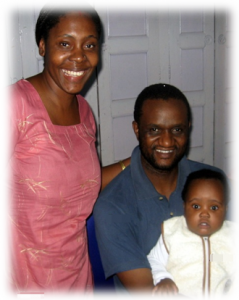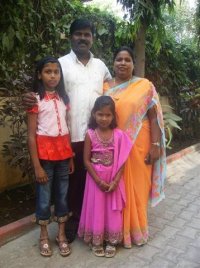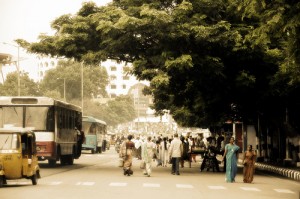ZIMBABWEANS ministering in INDIA
Posted by Reach The Unreached on January 6, 2011 · Leave a Comment
P and S’s Ministry Profile
(Names abbreviated to 1st letters only, for security purposes)
 S and I are both Zimbabweans. I have been with a missionary organization for the last 16 years. During the first 8 years I was serving in different roles in my home country. What got me into missions was learning about the unreached and the needs within the 10/40 window. It came as a shock that there existed people who had never heard about Christ. What amazed me was that the church in Zimbabwe didn’t seem to know about this or they were indifferent to what was happening.
S and I are both Zimbabweans. I have been with a missionary organization for the last 16 years. During the first 8 years I was serving in different roles in my home country. What got me into missions was learning about the unreached and the needs within the 10/40 window. It came as a shock that there existed people who had never heard about Christ. What amazed me was that the church in Zimbabwe didn’t seem to know about this or they were indifferent to what was happening.
In October 2004 we moved to South Varanasi, India where we joined a church planting team which mainly focused on sharing the Good News in culturally relevant ways to High Caste Hindus. We have been doing this through friendship building with the Hindu family we reside with and many others in the community. The first 2 years in South Varanasi were primarily focused on ministry through language learning (Hindi) and cultural acquisition. Now we are both fluent in Hindi and are continuing to do our best to understand the complexities of Hindu and Indian culture.
Besides being church planters, I am also involved in leadership coaching of other church planting leaders and teams in North India. My aim as church planting coach is to help church planters be effective and remain focused on seeing church planting movements. During the past year I have been involved in designing and implementing a coaching system for my mission organization’s church planters in North India. Our goal is to see less needless attrition, discouragement and to help church planters improve their own God-given, field-driven strategies.
S has a passion for Indian women and works closely with a number of women in the community. We have two kids, a 3 year old son (turns 3 on the 15th of January) and a one month old daughter, both of whom were born here in India.
 Our greatest needs right now are for a bigger, more spacious apartment with a yard for our kids to play in and money for transportation to visit and coach out-of-town church planting teams. We need an extra $100 a month for the apartment and about $150 a month for out-of-town church planting ministry.
Our greatest needs right now are for a bigger, more spacious apartment with a yard for our kids to play in and money for transportation to visit and coach out-of-town church planting teams. We need an extra $100 a month for the apartment and about $150 a month for out-of-town church planting ministry.
Our long term vision is to help facilitate church planting movements in North India by planting fellowships that are culturally relevant and coaching indigenous fellowship leaders who will in turn plant more churches among the Unreached. As we work towards the fulfillment of this vision we look forward to continuous partnership with you.
Sincerely,
P and S
Filed under STORIES - from the Field · Tagged with church planters in North India, church planting movements, church planting teams, culturally relevant, indigenous fellowship
We have never seen a wedding like this
Posted by Reach The Unreached on September 14, 2010 · Leave a Comment
“We have never seen a wedding like this,” said the smiling cousin of the groom as he greeted Dany (not his real name), a church planter among his own Wadar people.
The Wadar are some of the poorest people in Maharashtra, India. For many, the main livelihood is cutting rocks.
It was the wedding of Shankar, one of the first believers in a church planting work in Pune, India. Shankar grew up as a neglected orphan, yet somehow tied an influential extended family. The family had been happy when he had quite school to start earning a meager living as a digger. When he accepted Jesus, he eagerly began to learn about God and obey Him. His family pressured him to marry a Hindu girl of their choice and when he refused, they disinherited him.
When he later announced his engagement to another believing Wadar girl, a relative of Shankar’s named Hanuman showed up to confront the church planter Dany at his home, with a gun and a gang of thugs.
 Dany, a former gang leader, had grown up not knowing anything about Jesus or Christianity, except that Christians were bad. When he was a young adult he started to persecute Christians. Eventually when he was away in another city looking for work, he learned of God and acknowledged Jesus’ sacrifice on the cross and made Him lord of his life. As a result, Dany could not go back to his home town as people there wanted to persecute him.
Dany, a former gang leader, had grown up not knowing anything about Jesus or Christianity, except that Christians were bad. When he was a young adult he started to persecute Christians. Eventually when he was away in another city looking for work, he learned of God and acknowledged Jesus’ sacrifice on the cross and made Him lord of his life. As a result, Dany could not go back to his home town as people there wanted to persecute him.
Later after getting married, Dany wanted to reach his own people group. He and his wife Noel (not her real name) moved to Pune in 2001 and began a work among the Wadar. At that time, there were over 2 million Wadar with no church or organization working among them. They had no written language, no Bible, no Christian literature, or worship songs in their language.
“We do not want to fight,” said Dany, a veteran of many such fights, as he calmly and deliberately reasoned with Hanuman and the gang.
Five weeks later a smiling Hanuman and his family were among the few relatives that showed up for Shankar’s wedding, bringing a generous gift. Wadar weddings are often marked by loud drunken brawls, usually over the value of the gifts or the quality of food. But this wedding was different – peaceful and full of goodwill for the bridal couple.
Shankar and his wife to be received pre-marital counseling to help them truly partner together in life, as well as in ministry. Such an approach is important among the Wadar as the Gospel begins to penetrate the foundation of human relationships. Helping Shankar to leave behind the model of dominating, violent, and alcoholic men, and to genuinely love his new wife is huge.
Shankar is now one of the leading elders, and in charge of one of the 4 house churches planted in the city. He is still unable to read or write but he learns and teaches through story telling.
The work among the Wadar continues to grow with more churches, a shortwave radio broadcast in Wadari and the first Wadari worship CD. Now with 600-800 known believers, the Wadari are being reached and transformed by the Gospel.
Dany, Noel and their two daughters live in a one bedroom apartment. They are quite happy there, but all the rents in Pune are going up and they need more monthly support to help pay for the apartment and not have to move.
Ravi in Andhra Pradesh
Posted by Reach The Unreached on September 14, 2010 · Leave a Comment
In his college days, Ravi was a self-proclaimed atheist and communist. He was the leader of a political student group at his college, and was severely injured by an opposing political group during a demonstration. While in the hospital one of his attending nurses shared the Gospel with him, but he rejected her every word. For four days the nurse prayed and persevered, and on the fourth day Ravi understood his situation with God and decided to follow Christ.
After a time Ravi knew God had called him to ministry. However, Ravi was now married, and his wife was not convinced. She knew a life of ministry would not be easy. So Ravi fasted and prayed for fifteen days, asking God to change his wife’s heart. God answered and together they decided they would follow God, no matter the consequences.
 Over the next several years, Ravi and his wife planted two churches and during that time had two sons. Times were difficult however, and one of their sons developed a life-threatening sickness. Unable to afford medicine, Ravi and his wife watched as their first-born son went to be with the Lord. The following year their younger son fell down a well in the village. Again, unable to pay for the medical attention necessary to save him, he too died.
Over the next several years, Ravi and his wife planted two churches and during that time had two sons. Times were difficult however, and one of their sons developed a life-threatening sickness. Unable to afford medicine, Ravi and his wife watched as their first-born son went to be with the Lord. The following year their younger son fell down a well in the village. Again, unable to pay for the medical attention necessary to save him, he too died.
Wracked with grief, Ravi and his wife clung to God even more closely and pressed in to the work God had called them to. The two churches they had planted continued to grow. Ravi was introduced to the director of an established ministry that equipped nationals to plant churches and reach nationals for Jesus Christ. Ravi was invited to join this church planting network. As part of the network, Ravi received theological training, resources and coaching to help him in his calling. He began receiving a monthly stipend to lighten the burden of providing for his family.
Today, Pastor Ravi oversees the entire network of church planters in the state of Andhra Pradesh. God has blessed Ravi and his wife with two beautiful daughters, and together they continue to plant churches and proclaim the Gospel in India.
Filed under STORIES - from the Field · Tagged with church planters, church planting network
-
Recent Posts
Recent Comments
Support Those Working Among The Unreached
Subscribe
Categories
Follow Us On Facebook
Tag Cloud
10/40 window alumni of perspectives on the world christian movement be involved in what matters Christian witness church planter among his own church planters church planting movements church planting network church planting teams culturally close ethnic people groups of the world ethnos every nation fulfilling the great commission fully devoted followers of Christ gods kingdom Good News of the Gospel great commission house churches India indigenous community of believing Christians in need of monthly support invest in the kingdom Joshua Project latte-a-day live among the Unreached live their lives make disciples among every nation mission work north pakistan perspectives study program reaching the unreached peoples reach the unreached student mission convention supporting missionaries take the Gospel the Gospel begins to penetrate the foundation of human relationships The Wadar are some of the poorest people in Maharashtra unreached people Unreached people groups urbana intervarsity christian fellowship urgently needed bicycles where in the world world christian You Can Make a Difference
